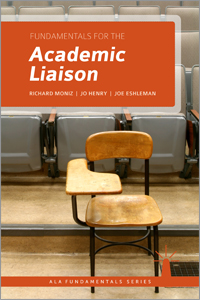Primary tabs
You don't need to be an ALA Member to purchase from the ALA Store, but you'll be asked to create an online account/profile during checkout to proceed. This Web Account is for both Members and non-Members. Note that your ALA Member discount will be applied at the final step of the checkout process.
If you are Tax-Exempt, please verify that your account is currently set up as exempt before placing your order, as our new fulfillment center will need current documentation. Learn how to verify here.
- Description
- Table of Contents
- About the authors
- Reviews
The changing higher education environment requires a new kind of relationship among faculty, academic liaisons, and students. A core resource for any LIS student or academic librarian serving as a liaison, this handbook lays out the comprehensive fundamentals of the discipline, helping librarians build the confidence and cooperation of the university faculty in relation to the library. Readers will learn about connecting and assisting faculty and students through skillful communication and resource utilization with coverage of key topics such as
- Orientation meetings
- Acquiring Subject specialization
- Advice on faculty communication and assistance
- Online tutorial creation
- Collection development
- Information literacy instruction
- Embedded librarianship
- Library guides
- New courses and accreditation
- Evaluation methods
Written in a straightforward way that lends itself to easy application, Fundamentals for the Academic Liaison provides ready guidance for current and future academic library liaisons.
Preface 1 Faculty/Staff Orientation Meetings2 Subject Expertise3 Communication with Faculty4 Online Tutorials5 Faculty Assistance6 Collection Development7 Teaching Information Literacy8 Embedded Librarianship9 Library Guides10 Accreditation and New Courses11 Evaluation ConclusionIndex
Richard Moniz
Dr. Richard Moniz is the director of library services at the Horry-Georgetown Technical College, which has campuses in Conway, Georgetown, and Myrtle Beach, South Carolina. He previously served as the director of library services for Johnson & Wales University’s North Miami campus from 1997 to 2004 and was director of library services for Johnson & Wales University’s Charlotte campus from 2004 to 2018. He is also an adjunct instructor for the University of North Carolina at Greensboro’s LIS program. In addition to publishing numerous articles, Moniz is the sole author of the textbook Practical and Effective Management of Libraries (2010) and the coauthor or coeditor of six other books: Fundamentals for the Academic Liaison (2014), The Personal Librarian: Enhancing the Student Experience (2014), The Mindful Librarian (2016), Librarians and Instructional Designers: Innovation and Collaboration (2016), The Dysfunctional Library: Challenges and Solutions to Workplace Relationships (2017), and Recipes for Mindfulness in Your Library (2019).
Jo Henry
Jo Henry is reference and instruction librarian at the Horry- Georgetown Technical College Library (Georgetown Campus), South Carolina. Previously she was a librarian at the Charlotte Mecklenburg Library and the information services librarian at South Piedmont Community College. She obtained her MLIS from the University of North Carolina Greensboro and a master’s degree in public administration from Georgia Southern University. She has coauthored four books: Fundamentals for the Academic Liaison (2014), The Personal Librarian: Enhancing the Student Experience (2014), The Mindful Librarian (2016), and The Dysfunctional Library: Challenges and Solutions to Workplace Relationships (2017). Henry has presented at numerous library conferences and has co-facilitated library workshops (alongside Richard Moniz and Joe Eshleman) both online and in North Carolina and South Carolina.
Joe Eshleman
Joe Eshleman is senior librarian at Central Piedmont Community College in Charlotte, North Carolina. He was previously the instruction librarian at the Johnson & Wales University Library– Charlotte from 2008 to 2015 and was head librarian for two years at the JWU Providence library. He received his MLIS degree from the University of North Carolina at Greensboro in 2007. He has completed the Association of College & Research Libraries’ Immersion Program, an intensive program of training and education for instruction librarians. Eshleman is a coauthor of Fundamentals for the Academic Liaison (2014), The Mindful Librarian (2016), and The Dysfunctional Library: Challenges and Solutions to Workplace Relationships (2017). He is also a coauthor of Librarians and Instructional Designers: Innovation and Collaboration (2016) and a contributor to The Personal Librarian: Enhancing the Student Experience (2014). He has presented at numerous conferences on instructional librarianship and other topics.
"It is easy to see this book becoming required reading for librarians pursuing a career in academia. However, many librarians struggle with how to be a better liaison regardless of how long they have been in the profession. This book is chock full of ideas, advice, and reasonable goals to set for oneself. This would be an excellent book to share in chapters at continuing education or brainstorming events with colleagues to discuss how to enhance or expand liaison service."
— Technicalities
"If the authors' recommendations are followed, the reader will come away with all the tools and knowledge needed to establish a successful library liaison program … the authors have written a work that will become indispensable to new and experienced liaison librarians alike."
— Journal of Electronic Resources Librarianship
"A valuable reference especially for librarians new to liaison work."
— Collection Management
"Moniz, Henry, and Eshleman provide a thorough strategy for transporting the library liaison of the past into the 21st century … Each chapter contains multiple checklists and a short conclusion, followed by a list of references. This title would be an excellent starting point for any new librarian, and I can definitely envision it being used as a library school textbook. In addition, this title could be a valuable read for seasoned librarians who want to transform their current library liaison program."
— Technical Services Quarterly



